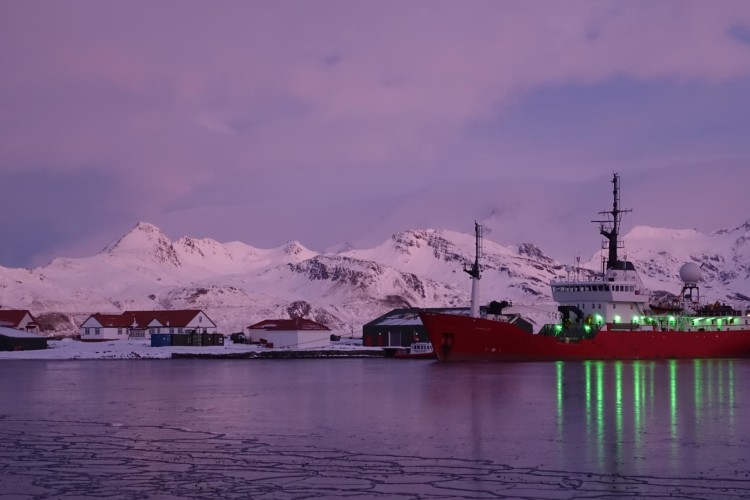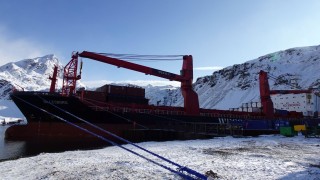The new wharf and mooring dolphin provide the extra capability required to berth the new UK polar research vessel, the RRS Sir David Attenborough. The MV Pharos SG, fishery patrol and logistics support vessel, will also use the new wharf.
As technical advisor to British Antarctic Survey (BAS), Ramboll provided the initial concept design and was on site to supervise the construction. BAM developed the detailed designs and constructed the new facility. Turner & Townsend provided cost management for the project.
Over two years of planning meant the King Edward Point (KEP) wharf was completed in just 108 days - three weeks ahead of schedule. Constructing on the sub-Antarctic island meant that every component had to be sent in a single shipment from the UK - the nearest builders’ merchant is thousands of miles away.
The new wharf was commissioned by the Natural Environment Research Council (NERC), the Foreign & Commonwealth Office (FCO) and the Government of South Georgia & the South Sandwich Islands (GSGSSI). The sub-Antarctic research station is owned by the GSGSSI and operated on their behalf by British Antarctic Survey (BAS). The project was joint funded between the partners: NERC £4m, FCO £4m (through the UK Government CSSF fund), GSGSSI £2.2m and BAS £0.8m.
Work was completed in time for Shackleton Day, marked in South Georgia on 20th May to commemorate explorer Ernest Shackleton’s arrival at the whaling station.
Protecting the environment was a key consideration at every stage of the planning and construction process. To minimise the footprint on the seabed, the new wharf was designed as an extension to the pre-existing wharf. A new retaining wall wraps around the former structure. The new mooring platform enables much larger vessels to dock and brings resilience against sudden weather changes. The layout maintains safe berthing and mooring operations for vessels up to 130 metres in length. Slipway upgrades facilitate the launching of small boats in a variety of tidal conditions.
To limit weather delay, the team developed innovative solutions such as a bespoke conveyor to backfill the new mooring platform from the shore. The construction also necessitated the close collaboration of specialists, including a dive team from Marine Civil Solutions.

BAS project manager Joe Corner said: “I am really proud to be involved in managing this project, and of everyone in the team who worked so hard to create this facility. With just a single summer season to complete the full works under challenging environmental conditions, meticulous planning and execution was required; the breeding cycle of native wildlife restricted the start date to January. With support from the UK, Holland and the Falklands Islands, the team developed detailed environmental management plans and applied innovative solutions to the challenges faced.”
Ramboll site supervisor Alan Roper said: “Like most remote projects, this unique setting brings extremes in the way of engineering challenges. Working collaboratively with the Government of South Georgia, project team and the research station’s science and operation staff, we were able to deliver the project successfully, minimising disruption to local wildlife and the everyday operations at the station.”
BAM project manager Daan Aldenberg said: “The KEP project has been a true collaboration between the Employer, GSGSSI, scientists, designers and the construction team. I’d like to acknowledge my thanks to all involved, for the support and commitment they have provided, in working together to achieve the successful construction of this infrastructure. Everyone should take great satisfaction in completing these works safely, ahead of programme and within budget, whilst ensuring there was no impact on the environment of this unique remote location.”
Helen Havercroft, CEO of the Government of South Georgia & the South Sandwich Islands said: “Whilst I had complete trust in the on-site construction team, I had real concerns about the unpredictable weather and gusting winds that can suddenly sweep in. The safety of personnel on site was a constant worry. It is a credit to the skills and determination of the project management and construction teams that we are able to announce the completion of the wharf ahead of schedule.”
South Georgia was once ground zero of the whaling industry but now undertakes research at King Edward Point to support the precautionary and sustainable management of the marine environment.
The project is part of the £140m Antarctic Infrastructure Modernisation (AIM) programme, which forms part of government investment to transform the UK’s Antarctic infrastructure to ensure that its facilities continue to enable frontier research.
Got a story? Email news@theconstructionindex.co.uk
.png)



